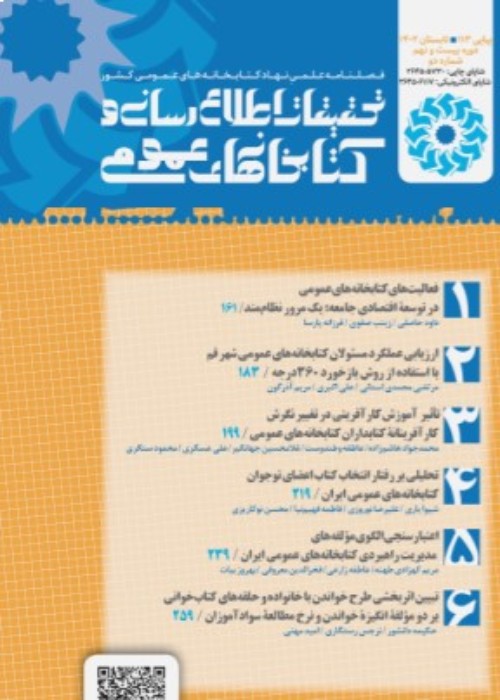The Role of Organizational Trust in the Transfer of Tacit Knowledge (Case Study: Public Libraries of Fars Province)
One of the challenges facing public libraries is the use of staff tacit knowledge. In this study, the effect of organizational trust (calculus-based trust, knowledge-based trust, and identity-based trust components) on the transfer of tacit knowledge of staff of Fars Province public library in Iran was investigated.
The present study is an applied research that has collected information by using a descriptive method. The statistical population of this research included all employees of public libraries in Fars province in 2021 (350 people), from 184 individuals were selected as the statistical sample of the research through using simple random sampling method. A questionnaire taken from Fuller’s research (2018) was used to collect data. The independent variable in this research is organizational trust, which includes calculus-based trust, knowledge-based trust, and identity-based trust components. The dependent variable is the transfer of tacit knowledge, which includes two components: the desire to share and the desire to use tacit knowledge. The validity of the questionnaire was calculated using Cronbach’s alpha and combined reliability. In order to investigate the effect of organizational trust on the transfer of tacit knowledge, confirmatory factor analysis and partial least squares technique were applied. Furthermore, SPSS and PLS software were used for statistical analysis.
The results show that the value of t-statistic, in relation to the effect of calculus-based trust on the willingness to share and use of tacit knowledge, is 2.39 and 2.87, respectively. Therefore, calculus-based trust has a positive and significant effect on the transfer of tacit knowledge. Regarding the effect of knowledge-based trust on the tendency to share and apply tacit knowledge, t-statistics are 4.94 and 6.35, respectively. Therefore, knowledge-based trust has a positive and significant effect on the transfer of tacit knowledge. Moreover, regarding the effect of identity-based trust on the tendency to share and apply tacit knowledge, t-statistics are 7.11 and 4.38, respectively. Therefore, identity-based trust has a positive and significant effect on the transfer of tacit knowledge. Furthermore, identity-based trust has a stronger effect on the tendency to share knowledge than sensory and knowledge-based trust. Calculus-based trust, knowledge-based trust, and identity-based trust have a positive and significant effect on employees’ willingness to use tacit knowledge.
The transfer of tacit knowledge is an interactive process that is basically based on trust between the parties. Therefore, it is necessary to examine the role of organizational trust in the transfer of tacit knowledge in a comprehensive and accurate manner in order to identify and remove potential barriers in this area. The results of the present study help the managers of public libraries to establish organizational trust in the relations between individuals and groups of employees, and provide the ground for the transfer of tacit knowledge in public libraries.
پرداخت حق اشتراک به معنای پذیرش "شرایط خدمات" پایگاه مگیران از سوی شماست.
اگر عضو مگیران هستید:
اگر مقاله ای از شما در مگیران نمایه شده، برای استفاده از اعتبار اهدایی سامانه نویسندگان با ایمیل منتشرشده ثبت نام کنید. ثبت نام
- حق عضویت دریافتی صرف حمایت از نشریات عضو و نگهداری، تکمیل و توسعه مگیران میشود.
- پرداخت حق اشتراک و دانلود مقالات اجازه بازنشر آن در سایر رسانههای چاپی و دیجیتال را به کاربر نمیدهد.



